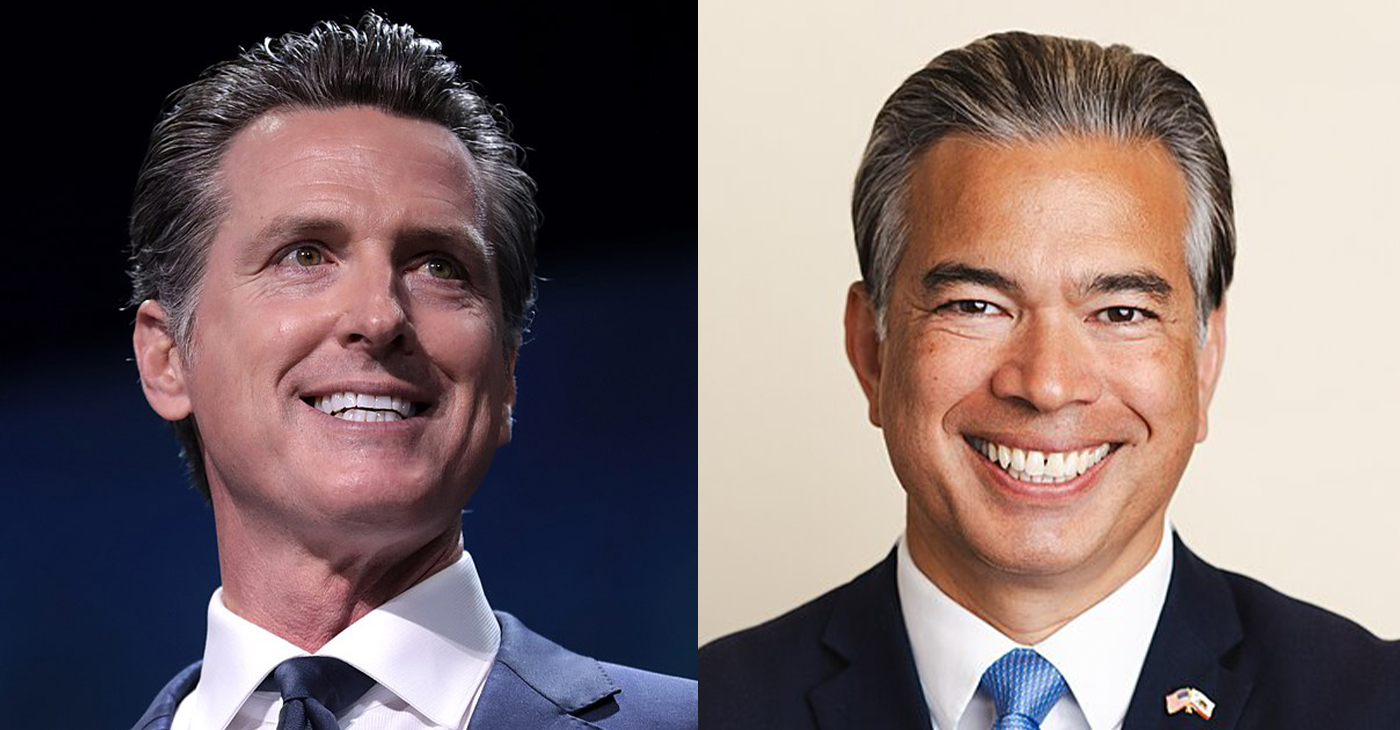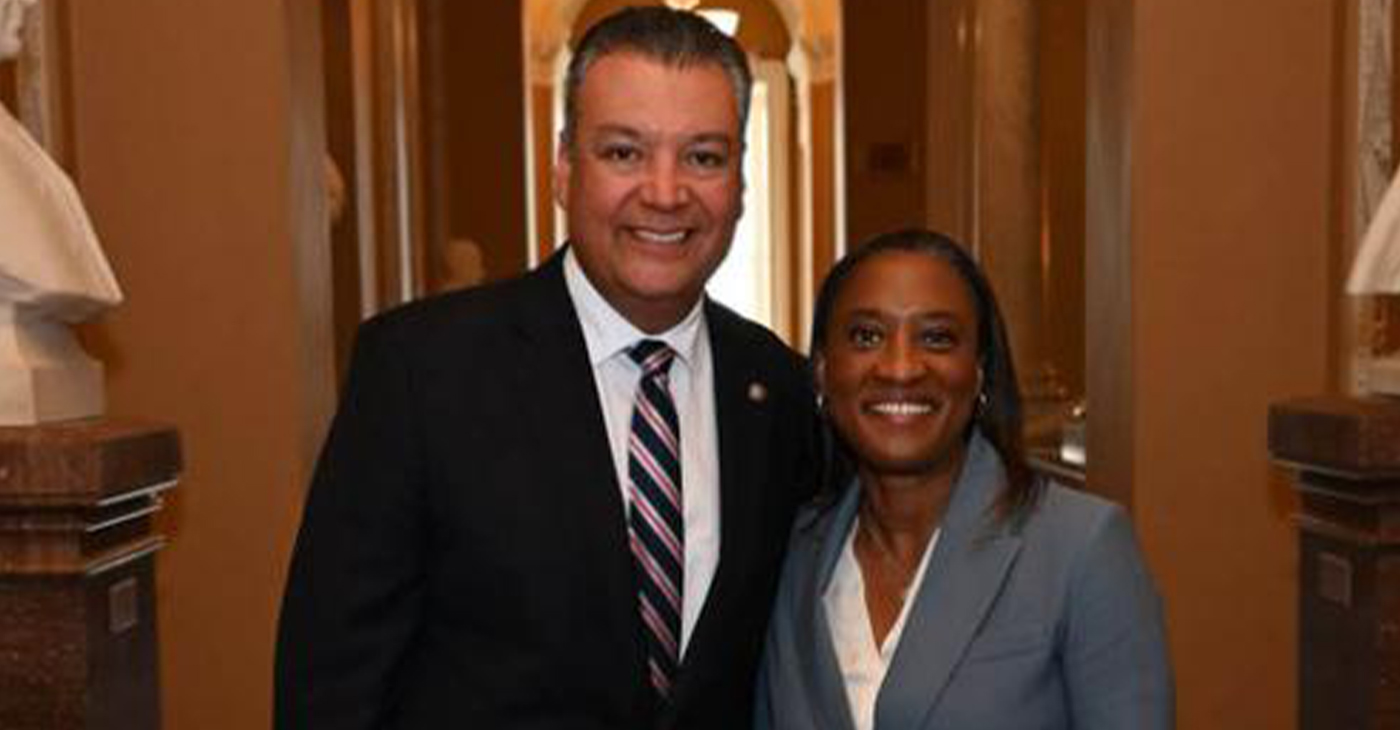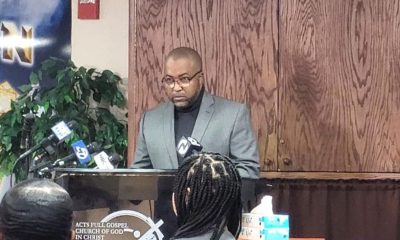Politics
US Appeals Court: NSA Phone Record Collection is Illegal

This June 6, 2013 file photo shows the sign outside the National Security Agency (NSA) campus in Fort Meade, Md. (AP Photo/Patrick Semansky, File)
LARRY NEUMEISTER, Associated Press
KEN DILANIAN, Associated Press
NEW YORK (AP) — The unprecedented and unwarranted bulk collection of the entire U.S. population’s phone records by the government is illegal because it wasn’t authorized by Congress, a federal appeals court said Thursday as it asked legislators to balance national security and privacy interests.
A three-judge panel of the 2nd U.S. Circuit Court of Appeals in Manhattan permitted the National Security Agency program to continue temporarily as it exists, but it all but pleaded for Congress to better define where boundaries exist or risk “invasions of privacy unimaginable in the past.”
The appeals court said if the government is correct in its legal arguments, it could also justify storing in bulk metadata associated with Americans’ financial records, medical records and electronic communications, including email and social media information.
An opinion written by Circuit Judge Gerald Lynch said Congress could “profoundly alter the legal landscape” after debate.
“Congress cannot reasonably be said to have ratified a program of which many members of Congress – and all members of the public – were not aware,” it said.
“The statutes to which the government points have never been interpreted to authorize anything approaching the breadth of the sweeping surveillance at issue here,” the court said. “The sheer volume of information sought is staggering.”
A lower court judge in December tossed out an American Civil Liberties Union lawsuit, saying the program was a necessary extension to security measures taken after the Sept. 11, 2001, terrorist attacks.
The NSA’s collection and storage of U.S. landline calling records — times, dates and numbers but not content of the calls — was the most controversial program among many disclosed in 2013 by former NSA systems administrator Edward Snowden. Some NSA officials opposed the program, and independent evaluations have found it of limited value as a counterterrorism tool. Snowden remains exiled in Russia.
U.S. Attorney General Loretta Lynch said the government is reviewing the court’s decision. She added that the June 1 expiration of the Patriot Act provisions provides opportunities to reauthorize the program “in a way that does preserve its efficacy and protect privacy.”
The court’s ruling sharpens the focus on the ongoing congressional debate.
Republicans and Democrats in the House have agreed on a bill to end the government’s bulk collection of the records, but Senate leaders are backing a competing measure that would maintain the status quo.
Senate Majority Leader Mitch McConnell and intelligence committee chairman Richard Burr took to the Senate floor Thursday with forceful arguments in favor of continuing the bulk collection. A Senate aide, however, speaking on condition of anonymity because he was not authorized to be quoted about internal deliberations, told The Associated Press the two senators remained open to a compromise that replaces NSA collection with a workable alternative that allows the agency to hunt for terror plots in the U.S.
The divisions on the issue don’t run neatly along partisan lines. Libertarian-leaning Republicans have joined many Democrats in arguing that a secret intelligence agency should not be storing the records of every American phone call, even if the data are only examined under limited circumstances. Some Democrats and Republicans assert that the program is needed now more than ever, given the efforts by the Islamic State group to inspire extremists to attack inside the U.S.
The House Judiciary Committee last month overwhelmingly passed the latest version of a bill known as the USA Freedom Act. The measure seeks to codify President Barack Obama’s proposal to end the NSA’s collection and storage of the phone records. Instead, it would allow the agency to request records held by telephone companies under a court order in terrorism investigations.
Under that proposal, the NSA might end up with access to even more data. As it stands, the program doesn’t collect data on most mobile calls, but under a new arrangement, the NSA could request mobile records as needed from phone companies.
NSA spokesman Edward Price said the agency is evaluating the ruling and added that it’s working closely with Congress on reforms.
Jameel Jaffer, ACLU deputy legal director and lead counsel in the case, said the decision “warrants a reconsideration of all of those programs, and it underscores once again the need for truly systemic reform.”
U.S. Rep. Adam Schiff, D-Calif., a ranking member of the intelligence committee, said he hopes the ruling serves as a “catalyst for an end to bulk collection and the beginning of serious reform.”
___
Dilanian reported from Washington. Associated Press writer Eric Tucker in Washington contributed to this report.
Copyright 2015 The Associated Press. All rights reserved. This material may not be published, broadcast, rewritten or redistributed.
Community
Gov. Newsom, Attorney General Bonta Back Bill to Allow California to Host Arizona Abortion Care
Gov. Gavin Newsom and Attorney General Rob Bonta announced last week that they are backing a bill introduced by the state legislative women’s caucus that would allow Arizona-based doctors to provide abortion care in California to patients from Arizona. Senate Bill (SB) 233 was authored in response to the Arizona Supreme Court’s decision on April 9 that an 1864 ban on abortion in the state is enforceable.

By California Black Media
Gov. Gavin Newsom and Attorney General Rob Bonta announced last week that they are backing a bill introduced by the state legislative women’s caucus that would allow Arizona-based doctors to provide abortion care in California to patients from Arizona.
Senate Bill (SB) 233 was authored in response to the Arizona Supreme Court’s decision on April 9 that an 1864 ban on abortion in the state is enforceable. The bill also aims to counter growing support for anti-abortion legislation in states with Republican-majority legislatures since Roe v. Wade was overturned, according to supporters.
“California will not sit idly by. We’re urgently moving legislation to allow Arizona doctors to provide safe and reliable reproductive care to Arizonans here in California,” Newsom said.
Sen. Nancy Skinner (D-Berkeley), chair of the California Legislative Women’s Caucus said that abortion bans are based on laws that set women back to a time when they had limited human rights.
“Anti-abortion forces have resurrected a dead law passed at a time when women couldn’t vote and husbands beating their wives was lawful,” Skinner said.
On April 24, the Arizona House of Representatives voted to repeal the 1864 abortion ban. It now moves to the Arizona Senate for deliberation.
California Black Media
California Senators Alex Padilla and Laphonza Butler Back Local News Resolution
Last week, California U.S. Senators Alex Padilla and Laphonza Butler, both Democrats, announced their support for a resolution that recognizes the significance of local news. In the resolution dated April 23, Padilla and Butler joined Senator Brian Schatz (D-Hawai’i) and 10 other colleagues in designating April as “Preserving and Protecting Local News Month.”

By California Black Media
Last week, California U.S. Senators Alex Padilla and Laphonza Butler, both Democrats, announced their support for a resolution that recognizes the significance of local news.
In the resolution dated April 23, Padilla and Butler joined Senator Brian Schatz (D-Hawai’i) and 10 other colleagues in designating April as “Preserving and Protecting Local News Month.”
The resolution acknowledges that local news outlets are a public good essential to preserving America’s democracy.
“Millions of Americans count on the local news to help them understand what is happening in their neighborhoods and around the country. Yet local newsrooms have suffered from some of the harshest layoffs and budget cuts in recent years,” Butler said in a statement.
“It is critical that we recognize the role our local press plays in keeping people informed on the world around them,” she said.
The resolution comes at a crucial time in the media industry when employment decreased by 26% nationwide between 2008 and 2020, according to supporters of the bill. Employment in the newsroom came with great uncertainty as more than 30,000 jobs were lost in the last two decades.
Sen. Schatz said that local news helps increase civic engagement and strengthens democratic norms and practices. This resolution will help local journalists maintain healthy and vibrant communities through valuable storytelling.
Activism
Calif. Anti-Sex Trafficking Advocates Discuss Competing Bills, Strategies
Advocates from across California are challenging state officials and community leaders to support legislation that provides resources and services for survivors and victims of human trafficking, as well as assistance as they transition back into civil society. Some of those advocates are also calling for more effective state policy to curtail trafficking, a crime that has an outsized impact on Black children, particularly girls.

By Bo Tefu, California Black Media
Advocates from across California are challenging state officials and community leaders to support legislation that provides resources and services for survivors and victims of human trafficking, as well as assistance as they transition back into civil society.
Some of those advocates are also calling for more effective state policy to curtail trafficking, a crime that has an outsized impact on Black children, particularly girls.
According to the FBI, a report covering a two-year period found Black children accounted for 57% of all juvenile arrests for prostitution. In addition, 40% of sex trafficking victims were Black and 60% of those victims had been enrolled in the foster care system.
“It is time to hold the perpetrators who take advantage of our children accountable,” said the Rev. Shane Harris, a San Diego-based activist, former foster youth and founder of the Peoples Association of Justice Advocates, (PAJA), a national civil rights organization and policy think tank.
“It is time to send a thorough message that if you seek to buy a child for sex, you will pay the highest criminal penalties in this state,” added Harris who was speaking at a rally at the State Capitol earlier this month. Harris was speaking in support of Senate Bill 1414, authored by Sen. Shannon Grove (D-Bakersfield), which calls for people who buy sex from minors to be punished with a felony. The punishment includes a two-year prison sentence and a $25,000 fine.
Harris said the PAJA is the only civil rights organization in the state that supports SB 1414.
Harris urged other Black-led groups who favor anti-trafficking legislation more focused on criminal justice reforms (as opposed to stiffer penalties), to “join the movement.”
Many of those civil rights groups fear that SB 1414 could lead to the incarceration of more Black youth.
Those sentiments were echoed in a panel discussion organized by Black women advocates on April 26 to examine the cause and effects of human trafficking in California’s Black communities. The virtual event was hosted by the Forgotten Children, Inc, a faith-based nonprofit that advocates for survivors and victims of human trafficking through anti-trafficking campaigns and initiatives.
Panelists shared the psychological impact of sexual exploitation on youth and children in the long term.
Author and educator Dr. Stephany Powell shared statistics and information revealing that African American women and girls are the most trafficked nationwide.
Powell, who serves as the senior advisor on law enforcement and policy at the National Center on Sexual Exploitation said that national data indicates that sex trade survivors are disproportionately women of color. She stated that male survivors often go unnoticed because boys rarely report trafficked crimes.
Powell said that decriminalizing prostitution in California could increase human trafficking. She argued that Senate Bill 357, authored by Sen. Scott Wiener (D-San Francisco), which was signed into law in 2022 and legalized loitering for prostitution, caused a surge in street-level prostitution.
Panelist and psychologist Dr. Gloria Morrow shared opposing views on decriminalizing prostitution. She said that decriminalizing prostitution could help survivors gain access to state resources and support.
Despite opposing views, Powell and Morrow agree that the Black community needs resources and educational programs to address human trafficking.
-

 Community2 weeks ago
Community2 weeks agoFinancial Assistance Bill for Descendants of Enslaved Persons to Help Them Purchase, Own, or Maintain a Home
-

 Activism4 weeks ago
Activism4 weeks agoOakland Post: Week of April 3 – 6, 2024
-

 Business2 weeks ago
Business2 weeks agoV.P. Kamala Harris: Americans With Criminal Records Will Soon Be Eligible for SBA Loans
-

 Community2 weeks ago
Community2 weeks agoAG Bonta Says Oakland School Leaders Should Comply with State Laws to Avoid ‘Disparate Harm’ When Closing or Merging Schools
-

 Activism3 weeks ago
Activism3 weeks agoOakland Post: Week of April 10 – 16, 2024
-

 Community2 weeks ago
Community2 weeks agoOakland WNBA Player to be Inducted Into Hall of Fame
-

 Community2 weeks ago
Community2 weeks agoRichmond Nonprofit Helps Ex-Felons Get Back on Their Feet
-

 Community2 weeks ago
Community2 weeks agoRPAL to Rename Technology Center for Retired Police Captain Arthur Lee Johnson
















































